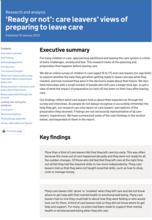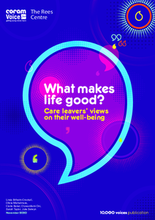Demographic Data
|
Sources: World Bank, UNICEF, UNDP HDR 2015, DHS 2013 |
Displaying 14401 - 14410 of 14551
This research looks at the planning and preparation that happens before leaving care in England. The report reflects the views of care leavers and whether the help they got when getting ready to leave care was what they needed, and how involved they were in the decisions made about their future.
This webinar featured presentations and discussions from practitioners who have experience of working on alternative care (short term and long term) and prioritising family-based care in emergency settings that could be helpful for practitioners in India as they plan a response for children who have lost parents to COVID-19.
A presente folha informativa foi pensada para facilitar a compreensão de problemas que afetam a vida de mulheres e meninas a partir de uma perspetiva de direitos
humanos.
This substudy aimed to contribute to a larger study—the Ripple project—through exploring the experiences of practitioners working across child welfare and mental health services regarding collaboration in the care of young people; and to identify practices that might enhance collaborative work and improve mental health outcomes.
This report analyses 1,804 care leaver responses collected in 21 English local authorities between 2017 and 2019.
The resources on this page address ways to advocate for families in the U.S. and include State and local examples.
This course is for caregivers and professional service providers working with children with disabilities, children at risk of family separation, or children in alternative care. SPOON designed this free course to unpack the components of mealtime that can be used for screening, how to differentiate food textures, and how to identify feeding difficulties and opportunities to support caregivers.
Theoretically-informed focused commentary on the literature in this paper considers the position of children and young people as embedded within socio-ecological systems. The specific focus is on the educational disadvantage of children and young people susceptible to involvement from child protection and welfare services in the Republic of Ireland.



